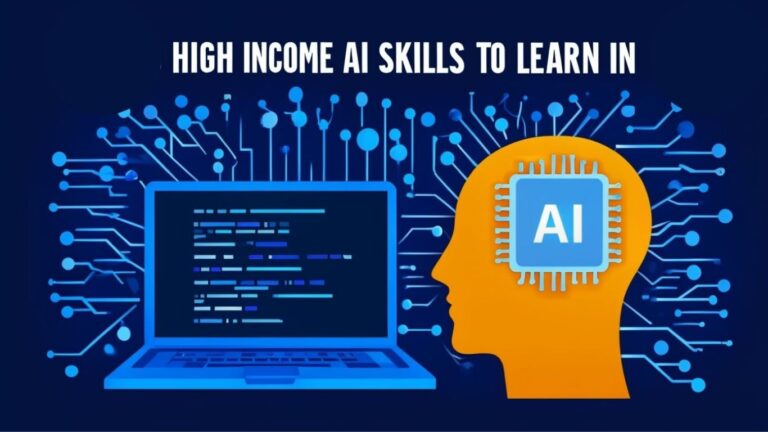Online shopping has never been more intuitive, fast, and personalized — and much of that transformation is thanks to AI in e-commerce. From tailored product recommendations to intelligent chatbots that assist 24/7, artificial intelligence is reshaping the digital shopping experience.
Whether you’re a consumer enjoying faster checkouts or an online store owner seeking smarter automation, AI is no longer a futuristic idea — it’s today’s e-commerce reality.
In this blog, we’ll explore how AI for online stores is revolutionizing everything from personalization and automation to product discovery and customer engagement.
The Role of AI in E-commerce Today
The integration of AI in e-commerce is not just a trend; it’s a strategic necessity. From enhancing the shopping experience to streamlining operations, AI for online stores is now a fundamental part of how modern e-commerce operates.
Today’s online platforms are powered by AI in ways many consumers don’t even realize – personalized homepages, predictive search bars, smart filters, and automated customer support are just the beginning.
Real-World AI Integrations in E-commerce
Here are some of the most common ways AI is being used across e-commerce platforms:
- Personalized product recommendations based on browsing behavior
- AI-powered chatbots offering 24/7 customer support
- Visual and voice search capabilities for better product discovery
- Inventory and demand forecasting using machine learning algorithms
- Customer segmentation and dynamic pricing for targeted marketing
Statistics That Show AI’s Growing Role in Online Retail
- According to Statista, the global AI in retail market is expected to reach $40 billion by 2030.
- Over 80% of online shoppers are more likely to buy from a store that offers personalized experiences (Salesforce).
- Businesses that use AI-powered automation see an average of 30% reduction in customer service costs (McKinsey).
These numbers show a clear trend: AI is becoming deeply embedded in how online commerce operates and scales.
Big Players Leading the Way
Several major companies are setting the standard for how AI can enhance e-commerce:
- Amazon: Uses AI for personalized product suggestions, warehouse automation, and Alexa voice shopping.
- Shopify: Offers AI-driven tools for marketing automation, fraud detection, and intelligent inventory management.
- Alibaba: Utilizes facial recognition for payments and AI-powered customer service agents.
These platforms are shaping expectations for online shopping — and smaller businesses are following suit.
Personalized Shopping Experiences with AI
In the world of online retail, personalization is no longer just a nice-to-have — it’s expected. Personalized shopping AI is making it possible to deliver unique experiences for every visitor, boosting both customer satisfaction and sales.
Whether it’s suggesting the perfect pair of shoes or auto-filling shopping carts based on past purchases, AI ensures shoppers see what they want — often before they know they want it.
How AI Tailors Product Recommendations
Using real-time behavioral data (clicks, searches, time on page), AI product recommendation engines analyze patterns and suggest products that align with each user’s preferences.
Here’s how it works:
- Tracks browsing and purchase history
- Adapts recommendations dynamically as behavior changes
- Accounts for context (time, location, device) to deliver timely suggestions
The result? A seamless, highly relevant shopping journey — not just for individuals but across all touchpoints: web, mobile, email, and even SMS.
Dynamic Content & User Segmentation
AI-driven personalization goes beyond product recommendations. It customizes entire on-site experiences by:
- Displaying different homepage banners for new vs. returning visitors
- Sending automated, personalized emails based on user behavior
- Grouping users into segments for targeted campaigns (e.g., budget shoppers vs. premium buyers)
This granular approach means customers feel understood — not sold to.
Case Studies: AI Personalization in Action
- Amazon: Its entire business model thrives on AI-driven product suggestions, driving an estimated 35% of total sales.
- Netflix (while not e-commerce, it’s a leader in personalization): Uses AI to recommend shows with uncanny accuracy, increasing watch time and customer retention.
- ASOS & Zalando: Fashion retailers that use personalized shopping AI to suggest outfits, predict trends, and improve customer loyalty through tailored experiences.
AI Product Recommendations: Boosting Sales & Engagement
Smarter Suggestions That Drive Real Results
Imagine walking into a store and being shown exactly what you’re looking for — before you even ask. That’s what AI product recommendations do for online shoppers.
Powered by machine learning, these smart systems analyze user behavior in real time to serve up relevant, personalized suggestions that increase conversion rates and boost engagement.
How Machine Learning Powers Product Recommendations
AI works behind the scenes by processing:
- Browsing history and click patterns
- Search queries and filters used
- Customer reviews, ratings, and preferences
- Time spent on product pages
- Purchase and cart abandonment history
This data is fed into algorithms that learn and evolve, offering more precise suggestions with every interaction — a powerful application of AI in e-commerce.
The Business Impact of AI Product Recommendations
Increased Conversions
Shoppers are more likely to buy when shown products they actually want. Studies show AI-driven recommendations can improve conversion rates by up to 300%.
Higher Average Order Value (AOV)
AI excels at upselling and cross-selling by identifying complementary products (e.g., “Complete the look” or “Frequently bought together”).
Improved Customer Retention
Personalized recommendations make customers feel understood, encouraging repeat purchases and long-term loyalty.
Cross-Selling & Upselling with AI Algorithms
Here’s how AI optimizes every step of the buying journey:
- Before checkout: Suggests add-ons or accessories
- During checkout: Recommends related or premium upgrades
- After purchase: Sends personalized follow-up offers via email or push notifications
By analyzing buying patterns across thousands of users, AI identifies trends that human marketers might miss — and it does so in real time.
AI Tools & Plugins for Small and Mid-Sized Online Stores
Even smaller businesses can leverage AI product recommendations with tools like:
- Shopify Apps:
- LimeSpot Personalizer
- Recom.ai
- Wiser Personalized Recommendations
- WooCommerce Plugins:
- Recommendation Engine
- Beeketing for WooCommerce
- BigCommerce Integrations:
- Nosto
- Dynamic Yield
These platforms make it easy to implement AI without writing a single line of code — bringing enterprise-level personalization to small and mid-sized e-commerce brands.
E-commerce Automation: Streamlining Operations
Let AI Do the Heavy Lifting Behind the Scenes
While shoppers see the sleek, personalized storefront, a powerful engine of e-commerce automation is often running in the background — thanks to AI.
From managing inventory and automating customer support to optimizing logistics and fulfillment, AI for online stores isn’t just improving customer experience — it’s transforming operational efficiency and profitability.
Key Areas Where AI Powers E-commerce Automation
- Inventory Management
AI tools forecast demand by analyzing trends, seasonal patterns, and historical sales data — helping retailers avoid overstock or stockouts. - Customer Service
AI-driven chatbots can handle 80%+ of common support queries instantly, reducing human workload while improving response times. - Logistics & Fulfillment
Smart warehousing systems use robotics and AI to automate order picking, packing, and delivery route optimization — speeding up the entire fulfillment cycle.
Real-World Examples of Automation in Action
- Chatbots:
- Zendesk AI and Tidio AI provide instant answers, order tracking, and even upsell suggestions, 24/7.
- Many Shopify and WooCommerce stores use plug-and-play AI bots to offer real-time support.
- Smart Warehouses:
- Amazon’s fulfillment centers use robotic arms and AI to sort and move packages with incredible efficiency.
- Ocado, a UK-based grocery tech company, uses AI to manage automated warehouses that fulfill thousands of orders daily.
- AI-Driven Fulfillment:
- Services like ShipBob and Flexport use AI to optimize warehouse locations, shipping speeds, and costs for online retailers.
AI-Powered Visual Search and Voice Commerce
As customer expectations evolve, so do the ways they search for products. AI in e-commerce is now enabling faster, more intuitive shopping experiences through visual search and voice commerce — especially on mobile devices.
Instead of typing keywords, users can now snap a photo or ask their voice assistant to find what they want, making discovery more natural, especially for mobile-first shoppers.
Visual Search: Shopping With a Snapshot
Visual search allows users to upload an image — or even take a live photo — and find similar or exact-match products instantly. This AI-driven technology analyzes shapes, colors, and patterns to surface highly relevant results.
Examples in Action:
- Pinterest Lens: Snap a picture, find similar fashion, home decor, or products.
- Google Lens: Identify products from the real world and see buying options online.
- ASOS & Zalando: Let users search fashion items by photo, improving product discovery and reducing bounce rates.
Benefit: Perfect for fashion, home decor, and lifestyle products where visual appeal matters most.
Voice Commerce: Hands-Free Shopping Is Here
Voice assistants like Amazon Alexa, Google Assistant, and Apple Siri are changing how people shop — especially on-the-go or in multitasking situations.
How It Works:
- Customers use voice commands to search, compare, or reorder products.
- AI interprets natural language, understands intent, and suggests relevant results.
- In some cases, customers can complete the entire transaction via voice.
Growth Insight:
- Voice commerce sales in the U.S. are projected to reach $30 billion+ by 2026.
- Over 60% of smartphone users say they’ve used voice search in the past year.
Why It Matters for Mobile E-commerce and Accessibility
Mobile-First Shopping: Visual and voice search reduce friction — no typing, fewer clicks, faster checkout.
Accessibility: Voice commerce improves inclusivity for visually impaired or differently-abled users, creating a better user experience for all.
Better UX = Better SEO: Search engines increasingly reward mobile-first, accessible websites — and AI-driven search tools contribute to that.
Challenges and Ethical Considerations
While AI in e-commerce offers massive advantages, it also comes with real-world challenges — especially when it comes to privacy, bias, and transparency.
As online stores increasingly rely on algorithms to make business decisions, it’s important to consider the ethical implications and long-term impact on customers, businesses, and society at large.
1. Data Privacy and Consumer Trust
AI systems thrive on data — but not all customers are comfortable sharing personal information.
Concerns include:
- Unauthorized data tracking and profiling
- Lack of transparency in how data is used
- Overreliance on cookies and third-party data
To build trust, AI for online stores must follow best practices around data security and be transparent about personalization methods.
Tip for store owners: Implement clear opt-in/opt-out features and follow regulations like GDPR and CCPA.
2. Algorithmic Bias and Fairness
AI systems can unintentionally reinforce bias based on:
- Product visibility (e.g., promoting high-margin items over better-reviewed ones)
- User profiling (e.g., offering different prices based on behavior or demographics)
- Skewed datasets that don’t reflect a diverse customer base
These biases can harm user trust and even result in legal challenges.
Solution: Use diverse, regularly updated data sets and audit AI systems for fairness.
3. Regulatory & Legal Risks
Governments are catching up to tech. As regulations tighten around AI and data privacy:
- E-commerce businesses must stay compliant
- Penalties for misuse or lack of transparency are increasing
- Ethical AI practices may soon be legal requirements, not optional standards
The Future of AI in E-commerce
As AI technologies evolve rapidly, the future of AI in e-commerce promises even more innovation and transformation. Businesses that stay ahead of these trends will gain a competitive edge in the crowded online marketplace.
1. Generative AI and Content Creation
From automated product descriptions to AI-generated marketing copy and visuals, generative AI is set to reduce content creation time and cost while maintaining personalization and creativity.
- AI can craft product descriptions tailored to customer preferences or seasonal trends
- Dynamic ad creatives and email content will become increasingly personalized and automated
2. Augmented Reality (AR) and Virtual Reality (VR) Integration
AI-powered AR/VR will blur the lines between physical and digital shopping by allowing customers to virtually try products — clothes, furniture, accessories — before buying.
- Virtual fitting rooms and 3D product demos
- Enhanced immersive shopping experiences boosting confidence and reducing returns
3. Predictive Analytics for Hyper-Personalization
AI will leverage big data to forecast customer behavior, inventory needs, and market trends with incredible accuracy.
- Anticipating buying patterns to optimize stock and marketing efforts
- Personalized promotions and dynamic pricing that adjust in real time
4. Conversational Commerce Goes Mainstream
Voice assistants and chatbots will become more human-like and context-aware, allowing natural, frictionless shopping experiences across channels.
- Multilingual, emotion-aware bots for global markets
- Seamless integration between voice, text, and visual search for unified experiences
5. Ethical and Responsible AI
As awareness grows, ethical AI will move from optional to mandatory, with businesses adopting transparent, fair, and privacy-conscious AI systems.
- AI audits and explainability tools becoming standard practice
- Customer trust as a core brand differentiator
Preparing Your Online Store for the AI-Driven Future
- Stay updated on the latest AI tools and trends
- Invest in scalable AI solutions tailored to your business size
- Prioritize customer data privacy and ethical AI practices
- Combine AI-driven automation with human-centered service
Conclusion: Transform Your E-commerce Business with AI
Artificial intelligence is no longer the future — it’s the present reality of successful online retail. From personalized shopping AI that delights customers to e-commerce automation that streamlines operations, embracing AI in e-commerce is essential for businesses ready to compete and grow.
By leveraging AI-powered tools like AI product recommendations, chatbots, visual search, and predictive analytics, online stores can create smarter, faster, and more engaging shopping experiences that convert browsers into loyal customers.
As technology advances, staying informed and adopting ethical, customer-focused AI strategies will set your store apart in a crowded market.
Ready to take your online store to the next level? Start exploring AI solutions today — your customers and your bottom line will thank you.





